
Mostly because of its resemblance to Khrushchev. Daniil Granin remembered him in his memoirs (by the way, the fat man was called Alexander Prokofiev):
“At a meeting of Soviet writers with N. S. Khrushchev, the poet S. V. Smirnov said:“ You know, Nikita Sergeyevich, we were now in Italy, many took Alexander Andreevich Prokofiev for you. ” Khrushchev looked at Prokofiev, as at his cartoon, at the caricature; Prokofiev of the same height, with the same rude physiognomy, fat, face, flattened nose ... Khrushchev looked at this caricature, frowned and walked away without saying anything. "
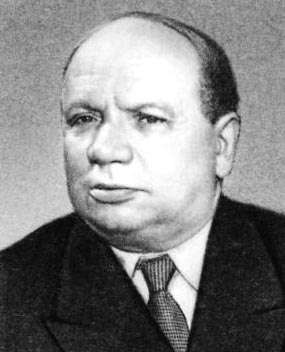
In general, the poet Alexander Prokofiev outwardly resembled a notebook bureaucrat from the Soviet comedy - very noisy and very harmful, but, by and large, herbivorous and cowardly, becoming hardened with any appearance of bosses.
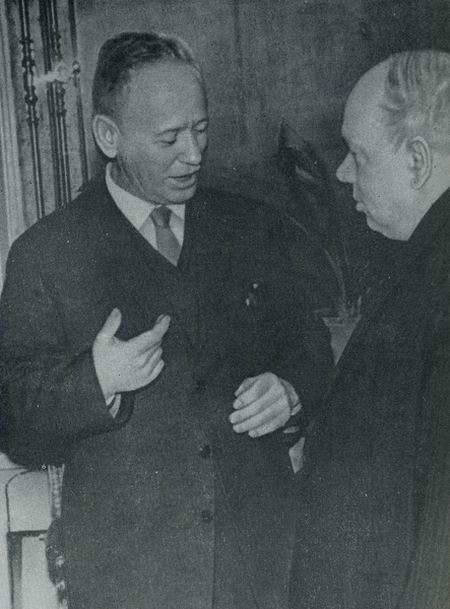
With Sholokhov
He, in fact, was this bureaucrat. Prokofiev held the post of executive secretary of the Leningrad branch of the Writers' Union, so he either constantly carried some Orthodox Communist blizzard from the rostrum, or engaged in various apparatus intrigues and spread rotter against the little things.
As for creativity - also nothing unexpected. Prokofiev wrote rather meaningless patriotic poems, which, due to the large number of references to birch trees and the Motherland, reinforced by the author's apparatus weight, were printed everywhere.
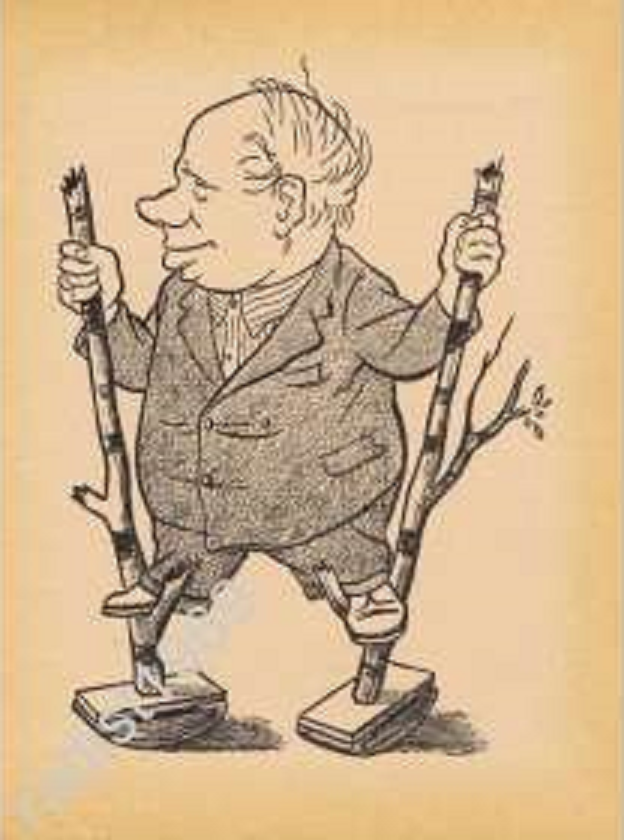
Cartoon by A. Prokofiev Joseph Igin.
His poem for children "Dear Country" even once entered into all school reading books. The poem, however, did not get any better:
On a wide expanse
Before dawn
Got scarlet dawns
Over the native country.
Every year more and more beautiful
Dear edges ...
Better Our Homeland
Not in the world, friends!
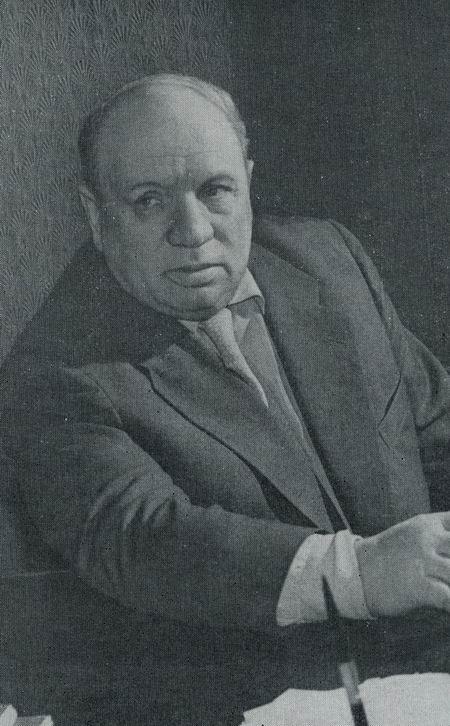
It would seem that the client is understandable and is not of interest.
But no.
He was not a herbivore.
***
We often forget that all the funny old fat women were once young and bald-free. In those years, our fat man looked like this:
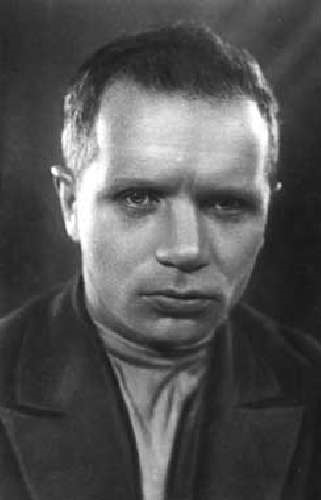
Looks bad, right? Such a crowd even to bully - think ten times. This is usually the view of people who have seen a lot in their lives.
Often too much.
And indeed it is.
He was a northerner - born and raised in a fisherman's family on the shores of Lake Ladoga. And in his youth came the Civil War.
I already said once - the Civil War was a branch of hell on earth. Not on the scale of the hostilities - on the bitterness with which it was fought. It really was some kind of breakthrough Inferno, the invasion of demons that took possession of the bodies and souls of people. Yesterday’s pharmacists and locksmith cut each other not only with enthusiasm - with pleasure, happily spitting blood. I recently wrote about two captains - this is how people need to turn their brains on themselves in order to arrange what they did with Kornilov’s body ?! Moreover, nothing depended on political views - both the Reds, the White, and the Green, and the specks were rampant. And while everything is everything! - they didn’t get drunk with blood; they didn’t calm down.
Alexander Prokofiev slurped her fill.
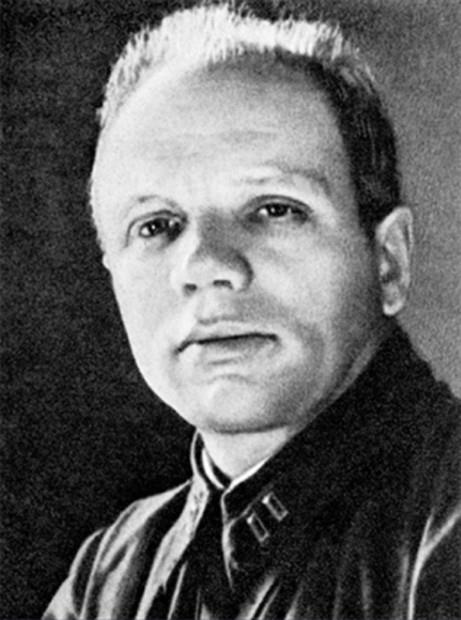
Together with his father who returned from the front, the 18-year-old failed rural teacher (three classes of teacher seminary) enters the committee of sympathizers to the Bolshevik communists. In just a couple of months he was leaving for the Red Army. The future responsible bureaucrat served in a guard company in Novaya Ladoga (3rd reserve regiment, 7th army), stood to death against Yudenich’s detachments, fought fiercely, was captured by the whites. They didn’t manage to send him to Dukhonin, the red-bellied nimble turned out to be running.
Since 1919 - a member of the RCP (b), after graduating from Citizen in 1922 he was transferred from the army to the bodies of the Cheka-OGPU, where he served until 1930. In general, how much and what he took on his soul over those years - he probably knew only himself.
Well and most importantly - this provincial security officer was incredibly, incredibly talented. That is why he left the Cheka as professional poets.
You read his early verses with your eyes wide. Where from? Where did all this primitive artifact, masterfully intertwined with the pathos of revolution - come from for an illiterate, in general, person? Read his "Bride" - this is not poetry, this is an old Russian northern conspiracy of some kind. The department, which he had gathered from the local Karelians, and they, as even small children know, are all one to one - sorcerers.
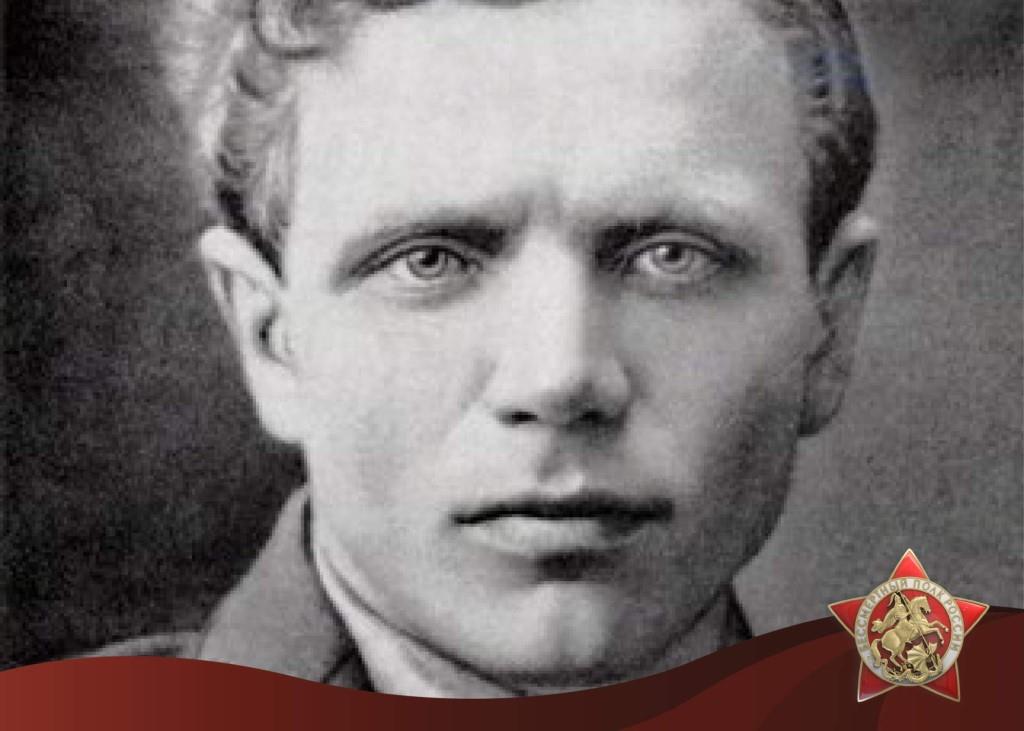
Or one of my favorites. The poem "Comrade" dedicated to Alexei Kraisky.
I will fill the country with a song like the wind
About how a comrade went to war.
Not the north wind hit the surf,
In dry plantain, in St. John's wort grass,
He went and cried the other side,
When my friend said goodbye to me.
And the song took off, and the voice grew stronger.
We break old friendships like bread!
And the wind is an avalanche, and the song is an avalanche ...
You are half, and half to me!
The moon is like a turnip, and the stars are like beans ...
Thank you, mother, for bread and salt!
Still you, mother, I’ll say newer:
It’s a good thing to raise sons,
Who are sitting in a cloud at the table
Which can go ahead.
And soon your falcon will be far away
You are better than salted him.
Salt Astrakhan salt. She
Suitable for strong blood and bread.
So that the comrade carried the friendship along the waves,
We have a little pink bread - and that in half!
If the wind is an avalanche and the song is an avalanche
You are half, and half to me!
From the blue Onega, from the loud seas
The Republic has stood at our door!
1929
When a song was written on these verses in the early 70s and it became a hit, I was always not happy with something in it, despite the excellent performance of the young Leshchenko.
Something always got in the way, like a pebble in sandals.
And only for adults did I understand that it was non-real.
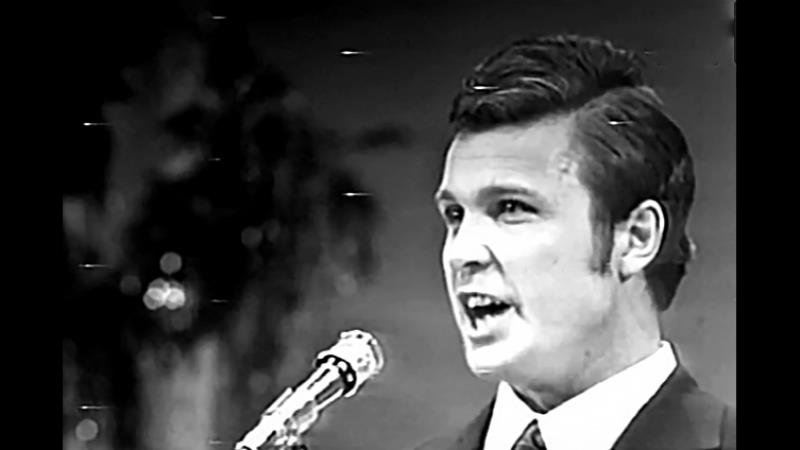
The words were not from here. Not from the 70s. They were from another non-vegetarian time. There was something bestial in them, some primitive power and primitive plastic, some savage bragging of a man who blew the blood of the enemy. These words are like a photographic plate on which the 20s were photographed - and not re-shoot.
And it was no accident that Yegor Letov, the most sensitive of all our rockers, beat them to the guitar: "The moon is like a turnip, and the stars are beans ...".

The Civil War in Russia had one unique feature. Soon after the Revolution, something permeated the air, water and soil in the territory of the former Russian Empire. I don’t know what. Anything. Some kind of phlogiston. Maybe the demons that broke through brought some demonic energy with them - I don’t know.
But there was definitely something.
It is impossible to explain to anyone else an unprecedented explosion of creative activity, epochal breakthroughs in all types of arts, all of these Platonov and Olesha, Prokofiev and Shostakovich, Dovzhenko and Eisenstein, Zholtovsky and Nikolaev, Grekov, Filonov and Rodchenko, Bagritsky, Mayakovsky, Smelyakov and a legion of others.
Moreover, it worked only in the country, this ephemeral something could not be carried away on the soles of boots. Nothing closely alike happened in exile, and only the most perspicacious and talented of the departed choked on longing evenings because there is corruption and life there.
And Arseny Nesmelov, a Russian fascist, a Japanese servant and a poet of God's mercy, sleeping in Harbin, tearing paper with a pen.
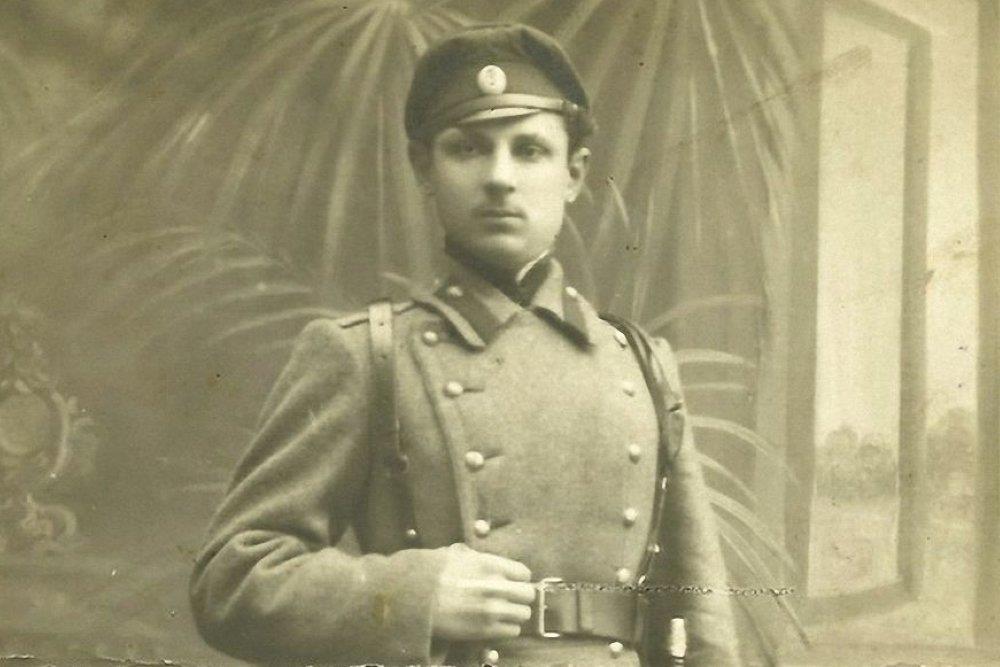
Almost simultaneously with Prokofiev, another ugly Russian poet, who knows the taste of blood firsthand, wrote another poem about his comrade on the last crumbs of the remains inside. It was called the “Second Meeting”:
Vasily Vasilich Kazantsev.
And I remembered fieryly - Having cleansed prominences,
A leather jacket and a zeis on a belt.
It’s irrevocably
And that image, time, do not touch.
Vasily Vasilievich - company:
“Behind me is a dash — fire!”
“Vasily Vasilich? Straight,
You see, a table by the window ...
Above the bills (stubbornly bent,
And a bald head, like the moon).
Honored Accountant. " Powerlessly
He stepped and instantly cooled ...
Lieutenant Kazantsev? .. Vasily? ..
But where is your Zeiss and mustache?
Some kind of joke, a mockery,
Are you all crazy! ..
Kazantsev hesitated under bullets
With me on the Irbitsky highway.
Bold days have not mowed us down - Will the bullets forget the burn! - And suddenly, sheviotic, blue,
A bag filled with boredom.
The most terrible of all revolutions
We answered with a bullet: no!
And suddenly this scumbag, kurguzy,
Already plump subject.
Years of revolution, where are you?
Who is your upcoming signal? “To your accountant, this is to the left ...”
He didn’t recognize me either!
It's ridiculous! Aged and Extinct
In the deserted autumn, naked,
But still, the office myrr — Lenin himself was our enemy!
1930
And in this miserable “Lenin himself” there is more defeat and hopelessness than in the volumes of the works of full-time accusers-propagandists.
However, in Soviet Russia, the feast of spirit was also not completely raging. About ten years later, the demonic phlogiston began to decay, the explosion of talent gradually subsided, and only the coolest - those who had their own strength, and not borrowed power, did not lower the bar.
But about them some other time.